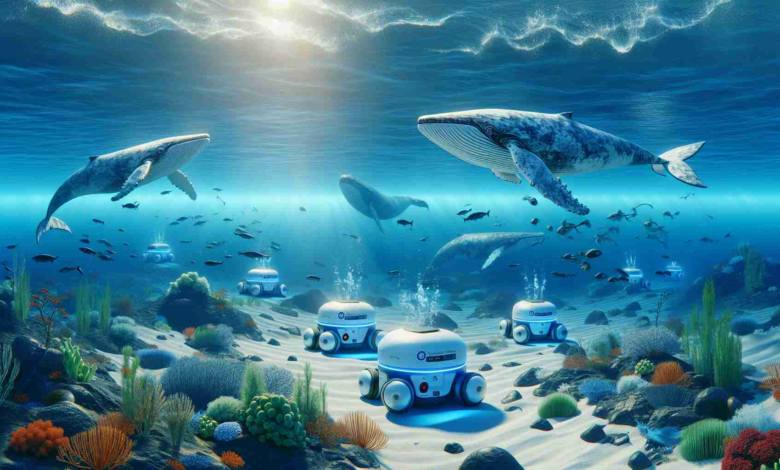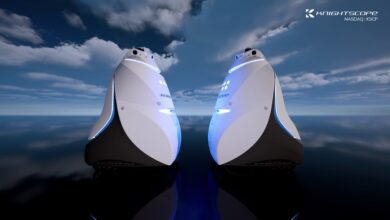Innovating Whale Research with Ethical Robotics

Summary: Project CETI is advancing scientific research while ensuring the ethical treatment of marine life by using robotics to facilitate a more humane method of tagging sperm whales. The initiative exemplifies a growing trend towards the incorporation of technology in wildlife research that prioritizes animal welfare.
Project CETI (Cetacean Translation Initiative), an ambitious scientific endeavor, is at the forefront of marine research by integrating robotics to humanely tag sperm whales. This innovative approach is redefining the interaction between robotics and wildlife conservation. As advanced technologies increasingly weave into the fabric of environmental studies, Project CETI’s adoption of robotics highlights a conscientious shift in marine research methodologies.
Instead of relying on traditional, more invasive tagging techniques, CETI’s team employs robots designed with animal welfare in mind. These robots gently and non-invasively adhere tags to sperm whales, which allows researchers to monitor the whales’ behavior and communication without causing them distress. This strategy underscores a significant move towards minimizing the impact of human activity on marine life and underscores the integral role technology can play in conservation efforts.
By prioritizing ethical approaches, Project CETI sets a precedent in wildlife research, paving the way for future projects where the integration of technology and ethics can go hand-in-hand. Their work not only contributes valuable data to the scientific community but also inspires further innovation in the development of equipment that facilitates the study of marine life in respectful, considerate manners. With the robot-assisted tagging of sperm whales, Project CETI serves as a beacon of responsible environmental stewardship and technological progress.
The Marine Research Industry & Market Forecasts
The marine research industry is crucial for understanding and protecting the world’s oceans and the diverse life forms they support. As new technologies are integrated, like in Project CETI, the sector is rapidly evolving. The global market for oceanography instruments, which includes tagging and monitoring devices for marine wildlife research, is expected to grow considerably. Market forecasts suggest an increasing demand for sophisticated marine technology spurred by the need for sustainable resource management, marine conservation efforts, and a rising focus on protecting biodiversity.
Emerging Technologies and Robotics in Marine Research
Robotics is one of the key areas of technological advancement in marine research. The employment of robotic devices for tagging, like those used by Project CETI, exemplifies the trend towards non-invasive research methods, which is likely to grow in prominence. These advancements include autonomous underwater vehicles (AUVs), remotely operated vehicles (ROVs), and drones, which collect data and images without direct human intervention, thus minimizing disturbance to marine life.
Issues and Ethical Considerations in Marine Research
The adoption of new technologies also brings forth ethical considerations and the need for responsible conduct in marine research. Issues such as privacy concerns relating to the tracking and monitoring of wildlife, the potential for disruption to natural behavior patterns, and the risks of technological malfunctions need to be carefully managed. It is crucial for the industry to foster an ethical standard in which animal welfare is paramount, echoing the guidelines observed by Project CETI.
Initiatives like Project CETI are contributing significantly to the understanding and preservation of marine life. A key to their success and sustainability will be continuing support from the scientific community, funding bodies, and public interest. Project CETI and similar endeavors play a pivotal role in demonstrating that it is possible to balance scientific curiosity with respect for nature, setting the stage for a more humane and sustainable interaction with our planet’s oceans.
For those looking to explore further information regarding the growing intersection of technology and marine research, trusted resources such as the scientific publications by Public Library of Science and organizations like the Ocean Conservancy provide valuable insights and data. Additionally, the National Geographic website offers engaging articles and updates on the latest in ocean exploration and conservation technology.

Michał Rogucki is a pioneering figure in the field of renewable energy, particularly known for his work on solar power innovations. His research and development efforts have significantly advanced solar panel efficiency and sustainability. Rogucki’s commitment to green energy solutions is also evident in his advocacy for integrating renewable sources into national power grids. His groundbreaking work not only contributes to the scientific community but also plays a crucial role in promoting environmental sustainability and energy independence. Rogucki’s influence extends beyond academia, impacting industry practices and public policy regarding renewable energy.



